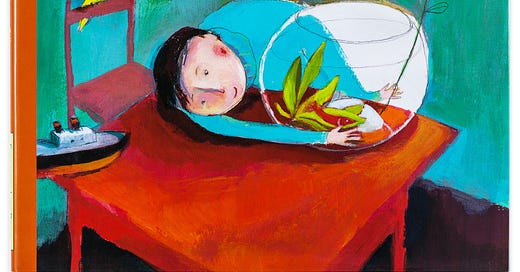Every once in awhile, you will come across something beautiful, poignant and articulate, that your heart will begin to bleed for it. The 'something' in my case is always a good piece of writing.
I read Maria Popova's Brainpickings, like most of her ardent followers—religiously. Her writing is the kind that makes my heart bleed. She pores over books and introduces her readers to truly exquisite pieces of writing. In one of her editions, Popova introduces her readers to This Is a Poem That Heals Fish by Jean-Pierre Simeón. Posed as answers to Arthur's quest to cure his pet fish of boredom, the book journey's through serious philosophical questions about life and relationships.

Arthur begins his quest by asking people he knows to explain to him what a poem means. My favourite is when Mahummoud answers the question: A poem is when you hear the heartbeat of a stone.
And so the poem continues until Arthur has gathered all the responses he possibly could:
A poem
is when you have the sky in your mouth.
It is hot like fresh bread,
when you eat it,
a little is always left over.
A poem
is when you hear
the heartbeat of a stone,
when words beat their wings.
It is a song sung in a cage.
A poem
is words turned upside down
and suddenly!
the world is new.
Such is the miracle of poetry. You will never return the same person once you've encountered a poem that alters you.
But for this alteration to occur, if you chose for it to be so, then you cannot eliminate one quintessential element—reading.
I coach aspiring writers, both young and old. But the refrain that I often hear when I ask them what they've been reading lately, most often is, "I don't read." 90% of my participants state they don't like to read or don't have the time for it.
What's the problem with that?
Think about it this way: for people to take what you say seriously, you will have to show you can walk the talk. Think of an artist who's never been to a gallery or looked at another painting. Or even for that matter, a doctor who's never practised on his patients. How will you trust the credibility of these individuals?
Will their work be taken seriously at all?
So why should a writer be any different? If a writer does not read, then not only is he not credible, but his writing will also be lacklustre.
Although the benefits of reading are universally acknowledged, very few people actively engage in reading quality literature. With the trashy news items and instant information available on the Internet, reading is slowly becoming like the dinosaurs--extinct.
When you read, you will find an infinite number of ways in which writers create a kaleidoscope with words.
Rich.
Supple.
Urgent.
Lyrical.
Reading fires the imagination. Imagination, in turn, helps us navigate the complex worlds we live in. In a world riddled with complexity, reading helps us understand the area known as the Theory of Mind.
Theory of Mind is "the human capacity to comprehend that other people hold beliefs and desires and that these may differ from one's own beliefs and desires." Complex human relationships characterize our world, and understanding others' mental states is a crucial skill that enables us to navigate this complexity that characterizes human societies.
ToM, as it's called, is activated when people read literary fiction. What is literary fiction? What are the best in-depth narratives to read?
Well, that will be the update in the next letter. Until then, carry on camping!









Share this post